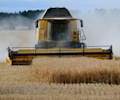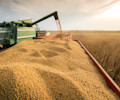What is the road ahead for regulatory approval and commercialisation in Brazil and beyond?
Aarti Ramachandran sat down with BRF’s Innovation and New Business Director, Sergio Pinto, and Sustainability Director, Mariana Modesto, to discuss the meat giant's game-changing partnership with Israeli start-up, Aleph Farms, to bring cultivated meat to the Brazilian consumer.
Interview with Sergio Pinto and Mariana Modesto
So, why is BRF pursuing this partnership with cultivated meat start-up Aleph Farms?
"BRF intends to lead the biggest transformation in the future protein supply and demand of this generation in Brazil. For this, the company strongly believes in innovative partnerships. Aleph Farms is one of the main players in this segment, based in Israel, a reference in food technology, research and generation of new business, and for these reasons, a natural choice to partner with. This partnership leverages BRF's strategy to integrate into the existing ecosystem of alternative proteins in order to drive a faster increase in cultivated meat."
And how does this Memorandum of Understanding (MoU) fit into BRF’s wider ‘Vision 2030’ plan?
"The initiative follows BRF´s strategic plan “Vision 2030”, announced to the market in December 2020, which expects revenues above R$ 100 billion by 2030. Our role is to foster and develop a global collaborative model that helps to maintain Brazil as a protagonist in food production in the world, and we believe that biotechnology brings benefits to the production chain and benefits to the environment, in addition to expanding the variety portfolio to meet all consumer types."
How will this partnership reduce environmental impact and strengthen supply chains?
"With this partnership, there are several sustainability gains: according to Aleph Farms, the technology used in cultivation guarantees savings of 70% of the water volume, avoids deforestation and the destruction of larger hectares of fertile land, in addition to contributing to the reduction of greenhouse gas emissions (the Aleph Farms' production aims to zero carbon emission completely by 2025).
We believe that in 2024 the product will be on the shelves in Brazil, as the initial market for this new protein.
In addition, BRF and Aleph Farms share the same values, using technologies that dispense with antibiotics, preserve animal welfare and do not use fetal bovine serum."
What does the road head for regulatory approval and commercialization in Brazil and beyond look like?
"From the perspective of the development of the technology, progress of the process, research with consumers, technical steps and regulatory rules, we believe that in 2024 the product will be on the shelves in Brazil, as the initial market for this new protein."
What are the sector-wide impacts of this announcement, and what can other animal agriculture companies learn from BRF’s leadership in the cultivated meat space?
"BRF’s entry into this segment drives scientific research in Brazil, which is extremely important for the academic community, as Brazil is the fourth country in studies on meat grown in the world.
With the arrival and growth of vegetable proteins, hybrids, cultivated - among others - we understand that the different sources of protein globally will change. It's already changing. It is our role to show the possible paths, paving the regulatory and consumer frameworks. Technology is a facilitator in this process."
BRF is primarily a pork and poultry company, while Aleph Farms specialises in cultivated beef. Why then did BRF choose to expand its exposure in beef through cultivated meat technology?
What we can expect, based on studies by FAO, is that by 2040 we will have main protein sources (animal, vegetable and cultivated) co-existing in equal proportions.”
"BRF's history shows the company's innovation DNA, which, with its brands including Sadia, Perdigão, Qualy and Banvit, follows the transformation of consumption habits of thousands of consumers. We live with different consumer profiles and our focus is to serve them.
Today, the energy conversion of chicken, our main protein, is superior to beef. As a result, and considering the productive impact of cattle production, the options for cultivated meat have sought solutions to beef."
And finally, how does this partnership position BRF for success? Will cultivated meat be a larger part of BRF’s portfolio in the future?
"It is too early to say. What we can say is that we expect a 50% to 70% growth in the share of high added value products in our portfolio.
In Brazil, the Company will grow with innovation for all consumption occasions and different consumer types (value-added pork meat; ready meals, snacks, spreads and new sources of protein), as well as other markets with growth potential (e.g. pet food). What we can expect, based on studies by FAO, is that by 2040 we will have main protein sources (animal, vegetable and cultivated) co-existing in equal proportions."












